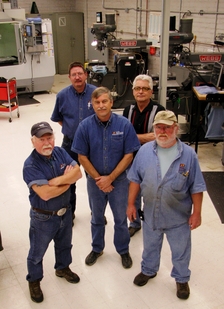
Skilled technicians set stage for successful research
Posted: April 25, 2011

The machinists of the Engineering Technical Services Instrument and Prototype Machine Shop: (back row from left) Dave Mushier and Dennis Golabiewski; (front row from left) Dave Gillespie, Marty Johnson and Ben Schwatken. Photo: Pete Zrioka/ASU
A look into the display case outside the door to the Engineering Technical Services Instrument and Prototype Machine Shop on Arizona State University’s Tempe campus gives you a glimpse of the wide variety and high precision of the work it produces.
From jobs as big as a complete groundwater- testing system to those as small as components for tiny microchips, the shop’s five machinists have completed more than 3,000 specific assignments – and that’s the count only since they started keeping track four years ago.
Machinists Dennis Golabiewski, Dave Gillespie, Ben Schwatken, Dave Mushier and Marty Johnson bring more than a combined 150 years of experience to their labors in support of research by faculty members and students in ASU’s Ira A. Fulton Schools of Engineering.
The shop’s crew has expertise in fields ranging from aerospace, automotive and mechanical engineering to biomedical, materials and civil engineering, giving them a broad understanding of manufacturing processes, and prototype design, development and construction.
Beyond their technical talents, they’re called upon to turn ideas into reality.
“We sometimes get designs and concepts sketched on napkins and notebook paper,” says Johnson, an instrument maker and designer. “It’s our job to figure out if it can work or not.”
The shop has created parts for a lightweight prosthetic limb that uses a spring to enable amputees to walk easier and faster. It has fashioned components for flexible plastic display screens for electronic devices that are being developed by ASU’s Flexible Display Center.
Among its largest works has been a 1/5th-scale model of the reactor fuel rods and cooling tanks of Palo Verde Nuclear Generating Station outside Phoenix. Constructed for a project by ASU’s Center of Environmental Fluid Dynamics, the model was used to help engineers figure out the cause of a fluctuation in the flow in the reactor that could potentially trigger false alarms.
The shop boasts eight kinds of milling machines used to craft complex parts out of solid materials. It also has six lathes – machines that rotate materials so they can be cut, sanded or drilled to various design specifications. Individual tasks can take anywhere from an hour to 1,000 hours.
“The cool thing about this place is that we’re what a large manufacturer would call a ‘captured shop,’ “ explains shop manager Golabiewski, “meaning we’re on hand at anytime to help someone with a quick job. There are few, if any, machine shops that will drop what they are doing for their regular customers to do a one-time job for someone they will never see again.”
The shop has a system in place “to make sure that a researcher can get the tooling he or she needs as soon as they need it.” Golabiewski says. “We’re here to help our researchers and students succeed in their endeavors.”
The shop’s value goes beyond technical capabilities and prompt services. It can provide machine work and produce devices at significantly lower costs.
“The machine shop is a great resource for our research, “ says materials science and engineering professor Nikhilesh Chawla. “We get first- class work and professional service for a fraction of the prices we would have to pay for services outside the university.”
A research group led by associate engineering professor Rolf Halden, assistant director of the Swette Center for Environmental Biotechnology in the ASU’s Biodesign Institute, has relied heavily on the skills of the shop crew for the past three years.
For Halden’s work, the shop has built complex devices as small as a matchbox and as large as a 20-foot-long stainless steel pipe. That pipe had to be fitted with customized diagnostic instruments enabling it to be deployed in groundwater wells hundreds of feet below the ground surface.
The instruments had to function with a high degree of precision to perform the task of helping researchers determine the most effective methods for cleaning up ground water at its source.
“The shop is a great asset,” Halden says. “I don’t hesitate to recommend its services to any colleagues or students.”
The shop has completed more than 60 projects in recent years for Steve Rednour, an equipment engineer at the Flexible Display Center.
“The time and money my department has saved has easily been in the thousands of dollars, and the shop’s estimates on costs and the time it will take to complete a job are always accurate,” he says.
The shop’s crew has also periodically “caught mistakes I made in my drawing and instructions,” and helped him make corrections, Rednour says. “They give close attention to detail. They really want to get projects done right.”
Civil engineering professor Edward Kavazanjian notes the machine shop’s added contribution as an educational asset.
The crew “helps educate students on how to prepare drawings and specifications that the shop can use to produce equipment necessary to perform research effectively,” Kavazanjian explains. “Producing those kinds of detailed drawings and designs is an essential skill students need to learn if they’re going to make research an essential part of their careers.”
Written by Pete Zrioka



































